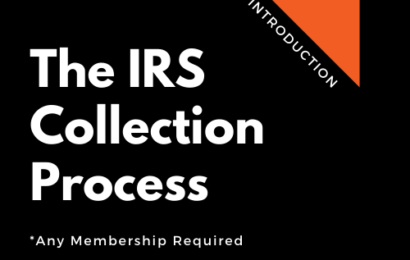
- Instructor: Attorney Bob Schaller
- Lectures: 1
- Quizzes: 1
IRS Acceptance & Rejection Determinations.
Acceptance or rejection of a proposed “routine” installment agreement is based on analysis of (a) compliance with filing and payment requirements, (b) collection information statements, and (c) taxpayer provided documentation. As explained in other lessons, special criteria exist for those taxpayers who qualify for Guaranteed, Streamlined or In-Business Trust Fund Express installment agreements. IRM § 5.14.1.4(2) (09-19-2014).
In determining the most appropriate program for resolving the balance due, the IRS considers actions that are least intrusive to the taxpayer and meet the need of the government for efficient collection of the tax, including viable payment options provided in IRM § 5.14.1.4.1 (01-01-2016) or IRM § 5.14.2 to ensure the taxpayers’ rights are protected. IRM § 5.14.1.4(2) (09-19-2014). An exception reducing the IRS’ analysis is made for installment agreement requests that are proposed in bad faith made to delay collection action. IRM § 5.14.3; IRM § 5.14.3.3 (06-11-2018).
The IRS considers filing and paying compliance prior to determining that the best manner of paying back-taxes is through an installment agreement. IRM § 5.14.1.4.2(1) (07-16-2018). Filing compliance means all required returns are filed or on an approved extension; payment compliance means all required federal tax deposits and/or estimated tax payments are current. IRM § 5.14.1.4.2(1) (07-16-2018). Taxpayers must be in compliance with all filing and payment requirements prior to approval of installment agreements. IRM § 5.14.1.4.2(4) (07-16-2018). Installment agreement requests will not be granted if taxpayers have not filed required returns. IRM § 5.14.1.4.2(5) (07-16-2018).






